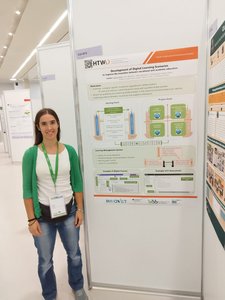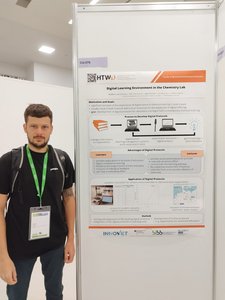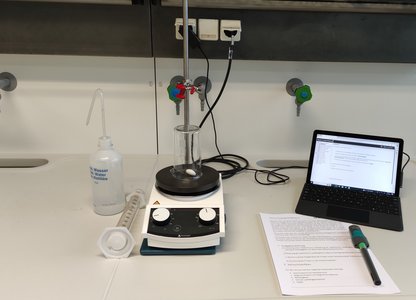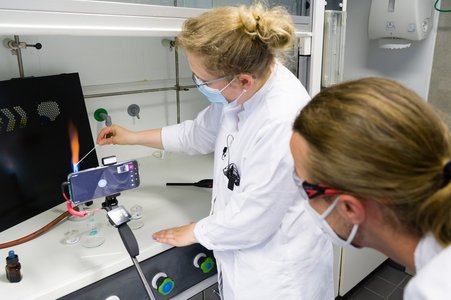Future Cluster for Innovative Vocational Training (CLOU)
![[Translate to English:] Mann sitzt am Schreibtisch und arbeitet am Laptop](/fileadmin/HTW/Fakultaeten/LUC/Bilder/Forschung/Chemie/Technische_Chemie/Digitale_Lernressourcen/laptop-2557468_1920.jpg)
General Information
The Future Cluster Innovative Vocational Education and Training (CLOU) project is part of the InnoVET innovation competition.
With the InnoVET programme, the Federal Ministry of Education and Research (BMBF) supports projects throughout Germany with the aim of increasing the attractiveness, quality and equivalence of vocational education and training. The programme is run by the Federal Institute for Vocational Education and Training (BIBB).
Background
Attracting, qualifying and retaining skilled labour is a key issue for companies in the chemical and pharmaceutical industry, especially small and medium-sized enterprises (SMEs). Company-specific professional upskilling after completing vocational training is currently associated with major hurdles. All too often, therefore, the further educational path of employees willing to gain qualifications leads to SMEs losing well-qualified skilled workers.
The CLOU project creates sector-specific training programmes and qualifies the relevant vocational training personnel.
Focal points of the HTW Dresden
In-depth analysis
The potential for permeability between vocational and higher education is analysed. The fields of activity of laboratory and operator occupations are analysed in comparison to chemical engineers.
Development, testing and evaluation of qualification programmes
Horizontal and vertical training programmes will be created for laboratory and operator occupations as well as laboratory-related activities. Suitable digital forms of teaching and learning are used for this purpose. The specialist knowledge imparted includes transition-relevant subject areas from chemistry such as general, analytical, inorganic and organic chemistry, but also topics relating to plant and occupational safety, digitalisation and networked production as well as key aspects of measurement, control and regulation technology.
The development of a shared internship exchange for members of the vocational and higher education systems will promote permeability between the two systems. The pool is intended to create opportunities for students in doubt. Through internships, students can familiarise themselves with the career opportunities at SMEs and gain insights into the activities of laboratory and operating professions in company-based training. In the opposite direction, the pool offers vocational training graduates with professional experience access to the programmes offered for the transition to higher education. The programmes enable them to familiarise themselves with the working methods and content of higher education.
The aim is to develop a tool for measuring subject-specific competences. To this end, a task pool based on the content of the relevant learning content is being programmed for the OPAL learning platform. This is aligned with the horizontal and vertical training programmes for laboratory and operator professions. With the aim of mutually recognising achievements as part of an electronically-supported examination and deriving corresponding qualification modules ("gap modules"), electronically-supported examinations are created from this. This should facilitate the mutual recognition of achievements between the vocational and higher education systems.
PROJECT RESULTS
The technical competence measurement tool HTWDATO (HTW Dresden - Digital Crediting and Recognition Tool) developed in the InnoVET-CLOU project is based on the results of analyses of training plans, training regulations, study regulations and module descriptions for chemical professions. It aims to facilitate transitions and the recognition of acquired professional competences.
The aim of the professional competence tool is to record the chemical professional competences of learners. The aim is to make the competences acquired creditable and to be able to offer learners suitable training opportunities. The tool is intended to demonstrate both formal and informal competences and ensure that these are measured in exam-like situations.
The focus of the competence tool is on standardised competence measurement in a direct subject-specific context. Subject-specific competences are measured in digital performance assessments that simulate exam-like situations. This enables a precise assessment of learners' subject-specific skills and knowledge.
The digital professional competence tool offers several advantages:
- Facilitation of credit transfer processes: The crediting of competences in further education and/or study modules is made easier.
- Flexibility in terms of time and location: Learners can carry out the professional competence assessment regardless of time and location.
- Parameterised tasks: Tasks can be parameterised and individually adapted.
- Customisation of the skills assessment: The skills assessment can be flexibly adapted to a wide range of application scenarios.
- Automatic or manual evaluation: Both automatic and manual evaluation of the test and participant results is possible, which increases the efficiency of data processing.
Overall, the digital technical skills tool offers a modern and efficient way of recording and recognising the technical chemical skills of learners, thereby improving the permeability between vocational and higher education.
As part of the InnoVET CLOU project, a comprehensive analysis was carried out to develop bridging courses that facilitate the transition between different educational levels. The preliminary work included analysing the training plans and training regulations for chemical laboratory technicians and chemical technicians as well as the study regulations and module descriptions for the Bachelor of Science at the HTW Dresden.
Analysis Results:
- Identification of intersections that show which competences the respective branches of training must master after graduation.
- The taxonomy levels applied make it clear that the depth of the individual specialist areas differs significantly.
The digital courses developed as part of the InnoVET CLOU project can be categorised into three levels:
- Introductory level: These courses are aimed at first-year students and are designed to teach the basics of chemical education and to break down the heterogeneity of first-year students. One example is the basic course "General and Analytical Chemistry", which is particularly suitable for the transition from school to university.
- Advanced level: These courses correspond to the specialisation in higher semesters and build on the basic courses.
- Expert level: These courses correspond to the level of knowledge in the Master's programme and offer in-depth specialisation.
The learning content of the courses is designed in such a way that the achievement of the learning objective can be checked by means of customised self-monitoring exercises. This structured and differentiated course development facilitates the transition between different educational levels and improves the recognition of acquired competences. Further digital offerings have been developed for the modules "Hazardous substances/technical safety" and "Fundamentals of reaction engineering".
ACTIVITIES
In the past project year, the project staff at HTW Dresden presented their project results in workshops, at scientific conferences and at public events:
- Science Forum (WiFo) of the German Chemical Society (GDCh) in Leipzig in September 2023
- DiCE Conference in March 2023
With the poster contributions at WiFo 2023, Ms Köhler and Mr Kranz took the opportunity to present and promote the InnoVET CLOU project in the scientific field at the central contact point for the entire chemical industry:
As part of the DiCE conference 2023 (DiCE: Digitalisation in Chemistry Education) of the GDCh Division of Chemistry Education, Mr Kranz presented his work on the "Creation of digital protocols in OPAL with ONYX" in a tooltip. In addition, the conference contribution will be published as open-access in a conference volume. With contributions on best practices from digital teaching at the network meetings for maths/physics and e-learning at HTW Dresden and TU Dresden and at the Workshop on e-Learning (WeL) at HTWK Leipzig, Mr Kranz and Ms Köhler took the opportunity to present results in the development of digital learning scenarios, to exchange ideas and to incorporate the latest findings into further project work. A paper on the "Development of digital learning scenarios" was submitted for the WeL conference proceedings.
The contributions and discussions at the conferences of the HRK Modus-Project in Munich and Essen impressively demonstrated how topical and important the issue of recognising and acknowledging formal and informal knowledge is for successful educational pathways. This confirmed the approach pursued in CLOU of using digital tools for credit transfer and recognition and the particular importance of these as a key element in strengthening reciprocal permeability in practice.
The project group also used the HTW Dresden Campus Day and the Long Night of Science to present their results to the general public with hands-on experiments and posters, thus drawing attention to the attractiveness of career paths in the chemical industry.
Project Partners
- Sächsische Bildungsgesellschaft für Umweltschutz und Chemieberufe Dresden (SBG Dresden),
- Bildungswerk Nordostchemie e.V. (bbz Chemie),
- Ausbildungsverbund Olefinpartner gGmbH (AVO),
- Fraunhofer-Gesellschaft zur Förderung der angewandten Forschung e.V. für Leistungen ihres Fraunhofer-Instituts für Organische Elektronik, Elektronenstrahl- und Plasmatechnik (FEP),
- Hochschule für Technik und Wirtschaft Dresden (HTW Dresden), Fakultät Landbau/Umwelt/Chemie, Professur Technische Chemie (Prof.in Harre),
- Technische Universität Dresden (TU Dresden): Fakultät für Erziehungswissenschaften, berufliche Fachrichtung Labor- und Prozesstechnik, Didaktik der Chemie (Prof.in Niethammer), Fakultät für Erziehungswissenschaften, Professur für Erwachsenenbildung, Schwerpunkt Beruflicher Weiterbildung und komparative Bildungsforschung (Prof.in Bohlinger),
- Technische Universität Darmstadt, AB Technikdidaktik (Prof. Tenberg),
- Forschungsinstitut für Leder und Kunststoffbahnen gGmbH (FILK),
- Helmholtz-Zentrum Dresden-Rossendorf e.V. (HZDR)
Project Coordination
- Sächsische Bildungsgesellschaft für Umweltschutz und Chemieberufe Dresden (SBG Dresden)
Further Information
- https://www.clou-zukunft.de/
Zu offizieller CLOU-Website
Weitere Dokumente/ Antragsformulare finden Sie hier: https://www.htw-dresden.de/en/luc/forschung/chemieingenieurwesen/translate-to-english-technische-chemie/polymere/translate-to-english-digitale-lehrressourcen-und-nachhaltigkeit/translate-to-english-zukunftscluster-innovative-berufliche-bildung-clou







![[Translate to English:] Gefördert als InnoVET-Projekt aus Mitteln des Bundesministeriums für Bildung und Forschung.](/fileadmin/HTW/Fakultaeten/LUC/Bilder/Forschung/Chemie/Technische_Chemie/Digitale_Lernressourcen/CLOU/InnoVET_Logoleiste_11x5cm.jpg)





